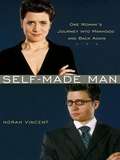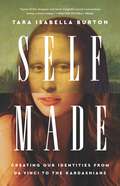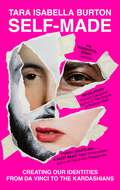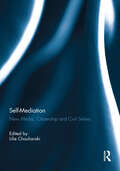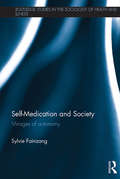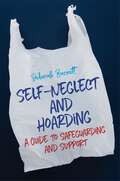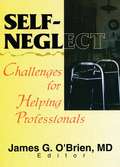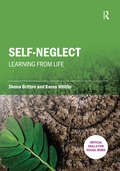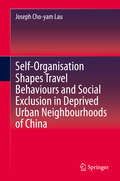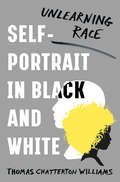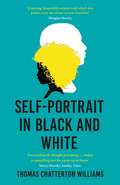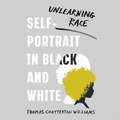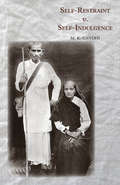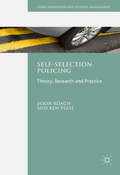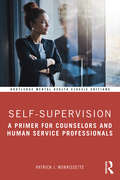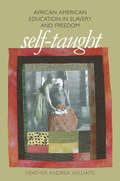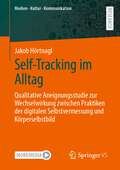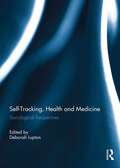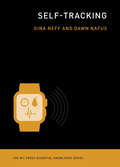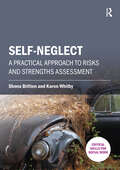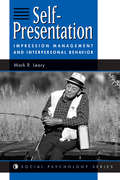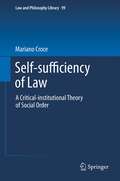- Table View
- List View
Self-Made Man
by Norah VincentA journalist's provocative and spellbinding account of her eighteen months spent disguised as a man Norah Vincent became an instant media sensation with the publication of Self-Made Man, her take on just how hard it is to be a man, even in a man's world. Following in the tradition of John Howard Griffin (Black Like Me), Norah spent a year and a half disguised as her male alter ego, Ned, exploring what men are like when women aren't around. As Ned, she joins a bowling team, takes a high-octane sales job, goes on dates with women (and men), visits strip clubs, and even manages to infiltrate a monastery and a men's therapy group. At once thought- provoking and pure fun to read, Self-Made Man is a sympathetic and thrilling tour de force of immersion journalism. .
Self-Made Man: One Woman's Journey into Manhood and Back
by Norah VincentA journalist's observations on her time living as a man.
Self-Made: Creating Our Identities from Da Vinci to the Kardashians
by Tara Isabella BurtonAn exceptional history of ideas and a contemporary critique on the story of self-making: from the Renaissance to the present dayToday's defining celebrities have crafted public personae that walk the tightrope between authenticity and artificiality. Ordinary people now follow suit: lovingly tending our 'personal brands' for economic gain and self-expression alike.Instagram culture is part of a story that goes back centuries. The vision that we not only can but should 'make' our own selves to shape our own destiny is an inextricable part of the formation of the modern world.As traditional powers of pre-modernity - church and throne - waned, a new myth took their place: that of the 'self-made man', whose unique powers of personality - or canny self-presentation - give him not just the opportunity, but the obligation, to remake reality in the image of what he wants it to be.From the Renaissance genius to the Regency dandy, the American prophets of capitalism to the aspirational übermensch of European fascism, Hollywood's Golden Age to today's Silicon Valley, Self-Made takes us on a dazzling tour of modern history's most prominent self-makers, uncovering both self-making's liberatory power, and the dangers this idea can unleash.'This funny, startling, insightful story of the selfie, from Dürer to the Kardashians, is a must read if you want to understand how we reinvent ourselves every time we reveal ourselves' PETER POMERANTSEV'Self-Made is both revelatory and a warning about the ways that focus on the self distorts our individual lives and the broader society' FRANCIS FUKUYAMA(P) 2023 PublicAffairs
Self-Made: Creating Our Identities from Da Vinci to the Kardashians
by Tara Isabella BurtonAn exploration into the curation of the self in Western civilization from Da Vinci to Kim Kardashian.In a technologically-saturated era where nearly everything can be effortlessly and digitally reproduced, we're all hungry to carve out our own unique personalities, our own bespoke personae, to stand out and be seen. As the forces of social media and capitalism collide, and individualism becomes more important than ever across a wide array of industries, "branding ourselves" or actively defining our selves for others has become the norm. Yet, this phenomenon is not new. In Self-Made, Tara Isabella Burton shows us how we arrived at this moment of fervent personal-branding.As attitudes towards religion, politics and society evolved, our sense of self did as well, moving from a collective to individual mindset. Through a series of chronological biographical essays on famous (and infamous) "self-creators" in the modern Western world, from the Renassiance to the Enlightenment to modern capitalism and finally to our present moment of mass media, Burton examines the theories and forces behind our never-ending need to curate ourselves. Through a vivid cast of characters and an engaging mix of cultural and historical commentary, we learn how the personal brand has come to be.
Self-Made: Creating Our Identities from Da Vinci to the Kardashians
by Tara Isabella Burton'We're all now self-makers, whether we like it or not - and this witty, sceptical book is the thought-provoking story of how we got here' GUARDIAN'This funny, startling, insightful story of the selfie, from Dürer to the Kardashians, is a must read if you want to understand how we reinvent ourselves every time we reveal ourselves' PETER POMERANTSEVToday's defining celebrities have crafted public personae that walk the tightrope between authenticity and artificiality. Ordinary people now follow suit: lovingly tending our 'personal brands' for economic gain and self-expression alike.Instagram culture is part of a story that goes back centuries. The vision that we not only can but should 'make' our own selves to shape our own destiny is an inextricable part of the formation of the modern world.As traditional powers of pre-modernity - church and throne - waned, a new myth took their place: that of the 'self-made man', whose unique powers of personality - or canny self-presentation - give him not just the opportunity, but the obligation, to remake reality in the image of what he wants it to be.From the Renaissance genius to the Regency dandy, the American prophets of capitalism to the aspirational übermensch of European fascism, Hollywood's Golden Age to today's Silicon Valley, Self-Made takes us on a dazzling tour of modern history's most prominent self-makers, uncovering both self-making's liberatory power, and the dangers this idea can unleash.'Both revelatory and a warning about the ways that focus on the self distorts our individual lives and the broader society' FRANCIS FUKUYAMA
Self-Mediation: New Media, Citizenship and Civil Selves
by Lilie ChouliarakiBlogs, You Tube, citizen journalism, social networking sites and museum interactivity are but a few of the new media options available for ordinary people to express themselves in public. This intensely technological presentation of everyday lives in our public culture is today hailed as a new, playful form of citizenship that enhances democratic participation and cosmopolitan solidarity. But is this celebration of self- mediation justified or premature? Drawing on a view of self-mediation as a pluralistic practice that potentially enhances our democratic public culture but which is, at the same time, closely linked to the monopolistic interests of the market, this volume critically explores the dynamics of mediated self-representation as an essentially ambivalent cultural phenomenon. It is, the volume argues, the hybrid potential for increased democratization but also for subtler social control, inherent in the public visibility of the ordinary, which ultimately defines contemporary citizenship. The volume is organized along two-dimensions, which conceptualize the dialectical relationship between new media and the participatory practices these enable in terms of, what Foucault calls, a dual economy of freedom and constraint (Foucault 1982). The first dimension of the dialectic, the ‘democratization of technology’ , addresses self-mediation from the perspective of the empowering potential of new technologies to invent novel discourses of counter-institutional resistance and activism (individual or collective); the second dimension, the ‘technologization of democracy’, addresses self-mediation from the perspective of the regulative potential of new technologies to control the discourses and genres of ordinary participation and, in so doing, to reproduce the institutional power relations that such participation seeks to challenge. This book was originally published as a special issue of Critical Discourse Studies.
Self-Medication and Society: Mirages of Autonomy
by Sylvie FainzangThe question of recourse to self-medication arises at the intersection of two partly antagonistic discourses: that of the public authorities, who advocate the practice primarily for economic reasons, and that of health professionals, who condemn it for fear that it may pose a danger to health and dispossess the profession of expertise. This books examines the reality of self-medication in context and investigates the social treatment of the notion of autonomy ever present in the discourses promoting this practice. Drawing on fieldwork conducted in France, the author examines the material, cognitive, symbolic and social dimensions of the recourse to self-medication, considering the motivations and practices of the subjects and what these reveal about their relationship with the medical institution, while addressing the question of open access to medicines – a subject of heated debate between the actors concerned on themes such as competence, knowledge and responsibility. A rigorous analysis of the strategies adopted by individuals to manage the risks of medicines and increase their efficacy, Self-Medication and Society will appeal to sociologists and anthropologists with interests in health, illness, the body and medicine.
Self-Neglect and Hoarding: A Guide To Safeguarding And Support
by Deborah BarnettSelf-neglect and hoarding is present in 1 of 5 social work cases in mental health and older people's services. These cases can be the most alarming and challenging on a social worker's caseload. A skilled, thorough risk assessment of the behaviours of self-neglect is needed in order to ensure effective care and support is available. This guide offers practical and applicable tools and solutions for all professionals involved in working with people who self-neglect. It includes tips for assessment and decision-making in the support process, and updates following the implementation of the Care Act 2014, which deemed self-neglect a safeguarding matter.
Self-Neglect: Challenges for Helping Professionals
by James G O'BrienUnderstand the complex ethical, legal, medical, and psychological issues of the most common form of elder abuse!Self-Neglect examines the social, ethical, medical, and practical implications of the most prevalent form of elder abuse. It can be difficult to diagnose and treat, and it poses ethical questions that cannot be answered simply. Yet it is so common and so destructive that anyone who works with geriatric patients must come to terms with it. Everyone is familiar with the image of the wild-haired elderly recluse hoarding junk in a dilapidated house, but to their neighbors, friends, and family--as well as to the health care professionals, social workers, and clergy who deal with them--these recluses are a special burden. They often refuse care despite such obvious problems as open sores. They tend to be intelligent and independent. Do they have the right to choose to live in squalor, or are their choices dictated by depression or other diseases? Do health care professionals have a responsibility to treat them against their will or a duty to respect their stated preferences?Self-Neglect examines the topics of passive suicide and indirect life-threatening behavior to help medical practitioners working with the elderly understand why patients do not follow doctor's orders or take care of themselves. Through case studies, this informative book explores the ways in which patients practice self-neglect by ignoring their doctors’advice, extreme lack of self-care, refusal to eat, failure to take their prescribed medication, and alcohol abuse. Self-Neglect offers insight into many facets of this condition, including:choosing among the many definitions of self-neglect what kinds of people become self-neglecting managing self-neglecting patients when and how to intervene the patient's autonomy and personal rights versus the rights of the community self-neglect as a way to gain control of a negative life situation when other tactics have failedDiscussing the sometimes tragic outcome of misdiagnosing self-neglect or leaving it untreated, this intelligent book will help you identify and understand this dangerous behavior and offer your patients better care for this condition.
Self-Neglect: Learning from Life (Critical Skills for Social Work)
by Shona Britten Karen WhitbyA practice-based perspective on working with people who self-neglect. This book explores the issues and situations which can arise and helps practitioners to adopt a strengths-based “Learning from Life” approach in the translation of MSP principles to practical implementation. Self-neglect: Learning from Life helps frontline practitioners ensure that Making Safeguarding Personal (MSP) is an everyday reality. Using two case scenarios, the authors examine issues and practice-based situations which arise in the daily application of MSP to casework with adults. The scenarios demonstrate lifespan and experience issues in the adoption of MSP as person-centred and person-led practice with people who self-neglect. The statutory principles of Empowerment, Prevention, Proportionality, Protection, Partnership, and Accountability are also translated into practical language and their meaning and implications are unpacked.This journey from principles to practical implementation uses a suite of clear and concise practice focused resources which adopt a person-centred, relationship-based approach to all conversations, interventions and aspects of practice. The resources include: a range from SnapShots on…- a selection of relevant topic areas in work with adults at risk through their safeguarding journey practice-based tools for practitioners to use in the quality monitoring of their own casework Taking it Further” referencing and suggested sources of more information. This invaluable book fills a gap that currently exists in the practical application of the statutory MSP principles as part of a “life-span approach” to work with people who self-neglect. It minimises the risks associated with “siloed” approaches to ensure the person is held at the centre of all interventions.
Self-Organisation Shapes Travel Behaviours and Social Exclusion in Deprived Urban Neighbourhoods of China
by Joseph Cho-yam LauThis book investigates the influence of self-organisation processes on the commuting of the poor workers in urban China. It suggests a new approach to investigate and measure individual access, and it argues that dynamic interactions between individual action and social structure influence individual’s access to transport, which cannot be measured using other traditional accessibility approaches.The overwhelming majority of models in transport research assume that socio-economic factors and the built-environment influence the accessibility of transport for individuals. This book provides evidence that individual decision-makings and actions are also vital factors to bring out changes in accessibility. Further, the study adopts a self-organisation process and structuration theory to illustrate that a significant proportion of travel problems of migrants are rooted in the interaction between actions and social structures. Any change in migrants’ actions or social structures in the self-organisation process would result in the production of complex and spontaneous travel behaviour. The self-organisation approach presented provides a new approach for urban transport planning in the future, particularly on the investigation of the accessibility of disadvantaged social groups. By using the social theories, transport research can have an effect on commuting behaviour and to improve poor workers’ quality of life.
Self-Portrait in Black and White: Unlearning Race
by Thomas Chatterton WilliamsA meditation on race and identity from one of our most provocative cultural critics. A reckoning with the way we choose to see and define ourselves, Self-Portrait in Black and White is the searching story of one American family’s multigenerational transformation from what is called black to what is assumed to be white. Thomas Chatterton Williams, the son of a “black” father from the segregated South and a “white” mother from the West, spent his whole life believing the dictum that a single drop of “black blood” makes a person black. This was so fundamental to his self-conception that he’d never rigorously reflected on its foundations—but the shock of his experience as the black father of two extremely white-looking children led him to question these long-held convictions. It is not that he has come to believe that he is no longer black or that his kids are white, Williams notes. It is that these categories cannot adequately capture either of them—or anyone else, for that matter. Beautifully written and bound to upset received opinions on race, Self-Portrait in Black and White is an urgent work for our time.
Self-Portrait in Black and White: Unlearning Race
by Thomas Chatterton WilliamsA SUNDAY TIMES BOOK OF THE YEAR A TIME 'MUST-READ' 'An extraordinarily thought-provoking memoir that makes a controversial contribution to the fraught debate on race and racism . . . intellectually stimulating and compelling' SUNDAY TIMESA reckoning with the way we choose to see and define ourselves, Self-Portrait in Black and White is the searching story of one American family's multi-generational transformation from what is called black to what is assumed to be white. Thomas Chatterton Williams, the son of a 'black' father from the segregated South and a 'white' mother from the West, spent his whole life believing the dictum that a single drop of 'black blood' makes a person black. This was so fundamental to his self-conception that he'd never rigorously reflected on its foundations - but the shock of his experience as the black father of two extremely white-looking children led him to question these long-held convictions.It is not that he has come to believe that he is no longer black or that his daughter is white, Williams notes. It is that these categories cannot adequately capture either of them - or anyone else, for that matter. Beautifully written and bound to upset received opinions on race, Self-Portrait in Black and White is an urgent work for our time.
Self-Portrait in Black and White: Unlearning Race
by Thomas Chatterton WilliamsA reckoning with the way we choose to see and define ourselves, Self-Portrait in Black and White is the searching story of one American family's multi-generational transformation from what is called black to what is assumed to be white. Thomas Chatterton Williams, the son of a 'black' father from the segregated South and a 'white' mother from the West, spent his whole life believing the dictum that a single drop of 'black blood' makes a person black. This was so fundamental to his self-conception that he'd never rigorously reflected on its foundations - but the shock of his experience as the black father of two extremely white-looking children led him to question these long-held convictions.It is not that he has come to believe that he is no longer black or that his daughter is white, Williams notes. It is that these categories cannot adequately capture either of them - or anyone else, for that matter. Beautifully written and bound to upset received opinions on race, Self-Portrait in Black and White is an urgent work for our time.(P) 2019 Tantor Media Inc
Self-Restraint V. Self-Indulgence
by M. K. GandhiThose who believe in self-restraint must not become hypochondriacs. The letters that come to me show that many correspondents brood over their ill-success the exercise of self-restraint. Like everything else that is good, self-restraint too requires an inexhaustible store of patience. There is absolutely no reason to despond, and there must be no brooding. There should be no conscious effort to drive away evil thoughts. That process is itself a kind of indulgence. The best prescription perhaps is non-resistance, i.e., ignoring the existence of evil thoughts and a continuous preoccupation with duties that lie in front of one. This presupposes the existence of some kind of all-absorbing service requiring the concentration of mind, soul and body upon it. “Idle hands some mischief still will ever find to do”, is never so applicable as in this case. Evil thoughts, much more evil deeds are impossible when we are thus preoccupied. Strenuous labour in accordance with one’s physical capacity is, therefore, absolutely necessary for those who will obey the law of self-restraint which is indispensable for individual as well as universal progress. M. K. Gandhi
Self-Selection Policing
by Ken Pease Jason RoachSelf-Selection Policing introduces and explores an approach for crime control which seeks to identify active, serious offenders by attending to the minor offences they commit. A foundation of theory and evidence is first supplied for the assertion that 'those who do big bad things also do little bad things'. Original research presented in the book includes a study of offending by visitors to a prison, and the concurrent criminality of those committing common driving offences and failure to produce driving documents as required. It illustrates how self-selection can complement other police methods of identifying active, serious criminals by focusing on what offenders do rather than who they are and what they have done in the past. Concentrating on the 'usual suspects' in the conventional way is often criticised as harassment and self-selection policing largely bypasses the issue of fairness this raises. The book concludes with a call for the consideration, development and wider adoption of the self-selection approach, and particularly the identification of other common minor offences which flag concurrent active criminality. The authors make important suggestions for the progression of SSP research and practice, including the identification of barriers to the implementation of the approach in wider police thinking, practice and policy. Practical guidance is also provided for those thinking of developing, testing and implementing the approach. In doing so, the book will be of particular interest for policing practitioners, as well as students and scholars of policing and crime control.
Self-Supervision: A Primer for Counselors and Human Service Professionals (Routledge Mental Health Classic Editions)
by Patrick J. MorrissetteSelf-Supervision synthesizes the literature on the theory and practice of self-supervision and provides counselors and human service professionals with a plan for the pursuit of independent professional growth. The classic edition includes a new preface from the author reflecting on his work and on the changes in society and the field since the book’s initial publication. In these chapters, professionals will find cost-effective and efficient strategies for developing their skills while still ensuring that they’re providing quality treatment. They’ll also find a diverse array of strategies for self-supervision and a thoughtful discussion of reflective processes required to effectively evaluate one’s own practices.
Self-Surrender: Tamil Cats or Sanskrit Monkeys? (Routledge Hindu Studies Series)
by Srilata RamanFilling the most glaring gap in Shrivaishnava scholarship, this book deals with the history of interpretation of a theological concept of self-surrender-prapatti in late twelfth and thirteenth century religious texts of the Shrivaishnava community of South India. This original study shows that medieval sectarian formation in its theological dimension is a fluid and ambivalent enterprise, where conflict and differentiation are presaged on "sharing", whether of a common canon, saint or rituals or two languages (Tamil and Sanskrit), or of a "meta-social" arena such as the temple. Srilata Mueller, a member of the Shrivaishnava community, argues that the core ideas of prapatti in these religious texts reveal the description of a heterogeneous theological concept. Demonstrating that this concept is theologically moulded by the emergence of new literary genres, Mueller puts forward the idea that this original understanding of prapatti is a major contributory cause to the emergence of sectarian divisions among the Shrivaishnavas, which lead to the formation of two sub-sects, the Tenkalai and the Vatakalia, who stand respectively, for the "cat" and "monkey" theological positions. Making an important contribution to contemporary Indian and Hindu thinking on religion, this text provides a new intellectual history of medieval Indian religion. It will be of particular interest to scholars of Shrivaishnava and also Hindu and Indian religious studies.
Self-Taught
by Heather Andrea WilliamsIn this previously untold story of African American self-education, Heather Andrea Williams moves across time to examine African Americans' relationship to literacy during slavery, during the Civil War, and in the first decades of freedom. Self-Taught traces the historical antecedents to freedpeople's intense desire to become literate and demonstrates how the visions of enslaved African Americans emerged into plans and action once slavery ended.Enslaved people, Williams contends, placed great value in the practical power of literacy, whether it was to enable them to read the Bible for themselves or to keep informed of the abolition movement and later the progress of the Civil War. Some slaves devised creative and subversive means to acquire literacy, and when slavery ended, they became the first teachers of other freedpeople. Soon overwhelmed by the demands for education, they called on northern missionaries to come to their aid. Williams argues that by teaching, building schools, supporting teachers, resisting violence, and claiming education as a civil right, African Americans transformed the face of education in the South to the great benefit of both black and white southerners. In this previously untold story of African American self-education, Heather Andrea Williams moves across time to examine African Americans' relationship to literacy during slavery, during the Civil War, and in the first decades of freedom. Some slaves devised creative and subversive means to acquire literacy, and when slavery ended, they became the first teachers of other freedpeople. Williams argues that by teaching, building schools, supporting teachers, resisting violence, and claiming education as a civil right, African Americans transformed the face of education in the South to the great benefit of both black and white southerners.-->
Self-Tracking im Alltag: Qualitative Aneignungsstudie zur Wechselwirkung zwischen Praktiken der digitalen Selbstvermessung und Körperselbstbild (Medien • Kultur • Kommunikation)
by Jakob HörtnaglDigitale Selbstvermessungsangebote wie Schrittzähler, Ernährungs-Apps oder Sport-Tracker machen den Körper als Objekt von Daten, Zahlen oder Graphen sichtbar. So bieten sie ihren Nutzer*innen laufend Anlässe, eigene Gewohnheiten, Ziele und Leistungen zu evaluieren und selbstbestimmt zu intervenieren. Diese qualitative Aneignungsstudie beschäftigt sich mit der Frage, in welcher Wechselwirkung diese Objektivierung des Körpers zum Körperselbstbild und Wohlbefinden der Nutzer*innen steht. Praktiken der digitalen Selbstvermessung werden im alltäglichen Gebrauch fester Bestandteil etablierter Körperpraktiken und Medienrepertoires, beeinflussen diese durch ihre spezifischen Potenziale aber auch nachhaltig. Die Integration in lebensweltliche Gewohnheiten wird als individueller Balanceakt nachgezeichnet, bei dem die oft mit solchen Angeboten verbundenen Verheißungen der Kontrolle und Selbstermächtigung eng mit Gefühlen des Erwartungsdrucks oder der Insuffizienz verbunden sind. Die vielfältigen Aneignungsweisen sowie deren Konsequenzen für das Wohlbefinden werden schließlich in einer Typologie zusammengeführt, um so den Blick auf die individuellen Kompetenzen zu lenken, die zu disruptiven oder protektiven Momenten der Mediennutzung beitragen können.
Self-Tracking, Health and Medicine: Sociological Perspectives
by Deborah LuptonSelf-tracking practices are part of many health and medical domains. The introduction of digital technologies such as smartphones, tablet computers, apps, social media platforms, dedicated patient support sites and wireless devices for medical monitoring has contributed to the expansion of opportunities for people to engage in self-tracking of their bodies and health and illness states. The contributors to this book cover a range of self-tracking techniques, contexts and geographical locations: fitness tracking using the wearable Fitbit device in the UK; English adolescent girls’ use of health and fitness apps; stress and recovery monitoring software and devices in a group of healthy Finns; self-monitoring by young Australian illicit drug users; an Italian diabetes self-care program using an app and web-based software; and ‘show-and-tell’ videos uploaded to the Quantified Self website about people’s experiences of self-tracking. Major themes running across the collection include the emphasis on self-responsibility and self-management on which self-tracking rationales and devices tend to rely; the biopedagogical function of self-tracking (teaching people about how to be both healthy and productive biocitizens); and the reproduction of social norms and moral meanings concerning health states and embodiment (good health can be achieved through self-tracking, while illness can be avoided or better managed). This book was originally published as a special issue of the Health Sociology Review.
Self-Tracking: The Mit Press Essential Knowledge Series (The MIT Press Essential Knowledge series)
by Gina Neff Dawn NafusWhat happens when people turn their everyday experience into data: an introduction to the essential ideas and key challenges of self-tracking.People keep track. In the eighteenth century, Benjamin Franklin kept charts of time spent and virtues lived up to. Today, people use technology to self-track: hours slept, steps taken, calories consumed, medications administered. Ninety million wearable sensors were shipped in 2014 to help us gather data about our lives. This book examines how people record, analyze, and reflect on this data, looking at the tools they use and the communities they become part of. Gina Neff and Dawn Nafus describe what happens when people turn their everyday experience—in particular, health and wellness-related experience—into data, and offer an introduction to the essential ideas and key challenges of using these technologies. They consider self-tracking as a social and cultural phenomenon, describing not only the use of data as a kind of mirror of the self but also how this enables people to connect to, and learn from, others.Neff and Nafus consider what's at stake: who wants our data and why; the practices of serious self-tracking enthusiasts; the design of commercial self-tracking technology; and how self-tracking can fill gaps in the healthcare system. Today, no one can lead an entirely untracked life. Neff and Nafus show us how to use data in a way that empowers and educates.
Self-neglect: A Practical Approach to Risks and Strengths Assessment (Critical Skills for Social Work)
by Shona Britten Karen WhitbySelf-neglect covers a wide range of behaviours, from neglecting to care for one's personal hygiene and health to one's surroundings; this can include behaviours such as hoarding of objects and/or animals. As presentation of self-neglect cases vary greatly, assessment and support planning should be made on an individualised case by case basis.Self-neglect describes a Risks and Strengths assessment model which has been developed by practitioners as an aid to frontline workers across all sectors, as well as agencies holding responsibilities in Safeguarding Adults. It aims to support and structure the effective, timely and consistent assessment of risk in relation to key social and healthcare factors of self-neglect both on an individual case level and at a strategic level in contributing to community/locality needs analysis and reporting mechanisms; including annual Safeguarding Adults Board Reports.
Self-presentation: Impression Management And Interpersonal Behavior
by Mark R LearyThis book is about the ways which human behavior is affected concerns with people may be doing, their public impressions they typically prefer that No matter what else other people perceive them in certain desired ways and not perceive them in other, undesired ways. Put simply, human beings have a pervasive and ongoing concern with their self-presentations. Sometimes they act in ceflain ways just to make a particular impression on someone else mras when a job applicant responds inthat will satisfactorily impress the interviewer. But more often, people 5 concerns with others’ impressions simply constrain their behavioural options. Most of the time inclined to do things that will lead others to see us as incompetent, inwnoral, maladjusted, or otherwise socially undesirable. As a result, our concerns with others’ impressions limit what we are willing to do.Self-presentation almotives underlie and pervade near corner of interpersonal life.
Self-sufficiency of Law
by Mariano CroceThe book investigates the role of law and legal experts in the organisational dynamics of a population, demonstrating that law is a stable practice among those who (in virtue of the special knowledge they master) are called upon to select the 'normative facts' of a population, i.e. the interactional standards that are proclaimed as binding for the entire population by the publicly recognised legal experts (whose peremptory judgments can be only revised by peers). It proposes an integration of the recent research outcomes achieved in three different areas of study: legal positivism, legal institutionalism and legal pluralism and examines the notions of rule, coercion, institution, practice elaborated by significant theorists in the mentioned areas and illumine both their merits and flaws. Furthermore it advances a notion of law and a description of the legal field which are able to account for the nature of the legal filed as the cradle of the social order. new back cover copy: In an era characterized by a streaking global pluralism, the collapse of many state agencies, the emergence of multiple sources of law, and the rise of informal justice, the idea of a unitary and homogenous legal system seems old-fashioned. But philosophers, sociologists and anthropologists still hold many debates on the nature of law and its function, which is that law represents an institution that characterizes any orderly social context of human beings, and this book plunges into the center of those debates. Self-sufficiency of Law: A Critical-institutional Theory of Social Order investigates the role of law and legal experts in the organizational dynamics of a population. It demonstrates that law is a stable practice among those who are called upon to select the "normative facts" of a population, that is, the interactional standards that are proclaimed as binding for the entire population by the publicly recognized legal experts. To do this, the author proposes an integration of the recent research outcomes achieved in three different areas of study--legal positivism, legal institutionalism and legal pluralism. He examines the notions of rule, coercion, institution and practice elaborated on by significant theorists in these fields, highlighting both the merits and flaws and ultimately advancing a notion of law and a description of the legal field which are able to account for the nature of the legal field as the cradle of social order. This text covers key guidelines for empirical research and political activities in Western and non-Western countries.
